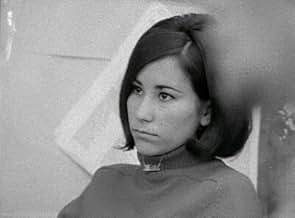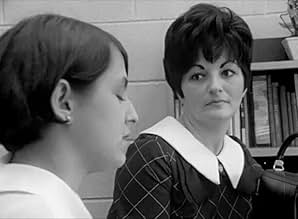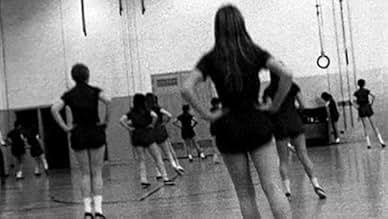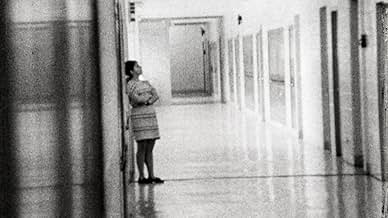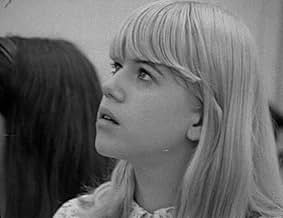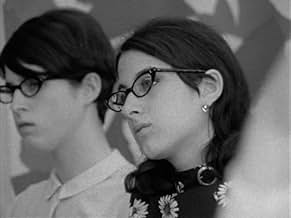IMDb-BEWERTUNG
7,5/10
2413
IHRE BEWERTUNG
Füge eine Handlung in deiner Sprache hinzuDocumentary filmmaker Frederick Wiseman takes us inside Northeast High School as a fly on the wall to observe the teachers and how they interact with the students.Documentary filmmaker Frederick Wiseman takes us inside Northeast High School as a fly on the wall to observe the teachers and how they interact with the students.Documentary filmmaker Frederick Wiseman takes us inside Northeast High School as a fly on the wall to observe the teachers and how they interact with the students.
- Regie
- Auszeichnungen
- 1 wins total
Empfohlene Bewertungen
As in TITICUT FOLLIES, Wiseman takes his camera inside an institution and exposes the authoritarianism that dominates the place. However, I have to say I was less disturbed by what I saw here. There are some clear instances of backwards attitudes: the notably different tones of the female and male sex ed lectures, what is apparently a fashion class where the teacher casually remarks of the students' physical shortcomings, and the chillingly obtuse reading of a letter from a student serving in Vietnam. But other clips that seemed designed to point out some sort of injustice or dehumanization didn't strike me as terribly egregious. Are we supposed to judge the English teacher as ridiculous for attempting to teach poetry with a Simon & Garfunkel song? When a kid says he doesn't deserve detention, are you just supposed to say "Oh, sorry about that" and let them skip it? Maybe some of the figures are a little out of touch and some are a little bit drunk on power, but I really didn't see a whole lot to make me think the school was a fascist nightmare or anything. Still, perhaps the attitudes speak louder than the actual actions, and there is a sense of isolation from the real world. And regardless of whatever messages Wiseman is trying to get across, it's a compelling look at a specific time and place.
"High School" is enthralling in one sense; if you are obsessed with the mundane "American Splendor" of generations past, then you will adore this documentary. For its time, it was brilliantly avant garde and remains so even today for its muted commentary on administration and the growing disparity between older generations and the younger high schoolers of the late 60's.
There is something purely amazing in viewing such settings in this vignette as they were, undoctored by Hollywood's lens. I am fascinated by the details of a time that I will never know personally and "High School" provides a brief glimpse into the mindset of the young adults of 1969 who are not unlike ourselves.
If you dig documentaries, please give this one a shot. Maybe you'll become as obsessed with "High School" as I have.
There is something purely amazing in viewing such settings in this vignette as they were, undoctored by Hollywood's lens. I am fascinated by the details of a time that I will never know personally and "High School" provides a brief glimpse into the mindset of the young adults of 1969 who are not unlike ourselves.
If you dig documentaries, please give this one a shot. Maybe you'll become as obsessed with "High School" as I have.
Sometimes the best films are those truest to themselves. There's nothing phony about this movie. It's a time capsule. It captured a cloistered, closed system from within. The results are spellbinding.
The faculty of NorthEast high school in Philadelphia are the stars. The viewer decides whether their actions are good or bad. There's certain purity at work. Is it an imperfect system? You bet it is. Do rules appear petty and draconian? Yes, they do. But there is hope inside the bubble. The faculty at NorthEast could be teachers at my high school. We have the flat-topped disciplinarian, the hip, young English teacher, the no-nonsense fashion matron, and the boring instructor with the bad teeth.
The scene with the coach and the graduate who visited while on leave from Vietnam illustrated one of the prominent themes; this environment is in a bubble insulated from community and society. In this scene, the coach made a connection between a soldier's war wound and the effect on his sports career. He was so wrapped up in his role as the school coach; he immediately applied news from the outside world to his microcosmic world inside the school grounds.
This theme was also reiterated by a boy in one of the rare scenes where students were the stars. The would-be bohemian said as much; this school is a cloistered, closed system. The bubble theme is further underscored by the sequence where three boys emerged from a space capsule simulator after 193 hours. There was much fanfare for the successful end to 'Project SPARC' including a telegram from astronaut Gordon Cooper, read with typical dragnet-style inflection by the sponsoring teacher.
In fact, several scenes feature extended recitations of written material by instructors who suffer from chronic educational ennui. There is the flat rendition of 'Casey at the Bat', the review of the typing test text, and the dreaded retelling of the "thought for the day" from the daily bulletin. A glimpse of self-awareness offered by a young English teacher was most startling. In the course of dissecting Paul Simon's poem "The Dangling Conversation", she read it aloud first, and followed with the Simon & Garfunkel song version. She told the students to listen to both versions. The poem came alive with the music. A lingering shot of the teacher showed the hope in her eyes that someone will get the message. For me, it's the best sequence in the film. If Wiseman wanted to underscore a failure of the system, it lied not with the disciplinarian tactics or heavy-handed advice dispensed by the staff, but with the inadequacy of the delivery methods used by educators.
The message turns hopeful in the last scene. A teacher reads a letter at a faculty meeting written by the former student on station in Vietnam. Tight camera work reveals the emotion of the reader, in contrast to the non expressive faces of the previous speakers. The written word provides power after all. There's hope on the part of the student to survive outside the system, hope on the part of the administrator reading the note that they do have an impact on their charges, and hope that inside a flawed machine such as the educational system, someone gets the message.
The faculty of NorthEast high school in Philadelphia are the stars. The viewer decides whether their actions are good or bad. There's certain purity at work. Is it an imperfect system? You bet it is. Do rules appear petty and draconian? Yes, they do. But there is hope inside the bubble. The faculty at NorthEast could be teachers at my high school. We have the flat-topped disciplinarian, the hip, young English teacher, the no-nonsense fashion matron, and the boring instructor with the bad teeth.
The scene with the coach and the graduate who visited while on leave from Vietnam illustrated one of the prominent themes; this environment is in a bubble insulated from community and society. In this scene, the coach made a connection between a soldier's war wound and the effect on his sports career. He was so wrapped up in his role as the school coach; he immediately applied news from the outside world to his microcosmic world inside the school grounds.
This theme was also reiterated by a boy in one of the rare scenes where students were the stars. The would-be bohemian said as much; this school is a cloistered, closed system. The bubble theme is further underscored by the sequence where three boys emerged from a space capsule simulator after 193 hours. There was much fanfare for the successful end to 'Project SPARC' including a telegram from astronaut Gordon Cooper, read with typical dragnet-style inflection by the sponsoring teacher.
In fact, several scenes feature extended recitations of written material by instructors who suffer from chronic educational ennui. There is the flat rendition of 'Casey at the Bat', the review of the typing test text, and the dreaded retelling of the "thought for the day" from the daily bulletin. A glimpse of self-awareness offered by a young English teacher was most startling. In the course of dissecting Paul Simon's poem "The Dangling Conversation", she read it aloud first, and followed with the Simon & Garfunkel song version. She told the students to listen to both versions. The poem came alive with the music. A lingering shot of the teacher showed the hope in her eyes that someone will get the message. For me, it's the best sequence in the film. If Wiseman wanted to underscore a failure of the system, it lied not with the disciplinarian tactics or heavy-handed advice dispensed by the staff, but with the inadequacy of the delivery methods used by educators.
The message turns hopeful in the last scene. A teacher reads a letter at a faculty meeting written by the former student on station in Vietnam. Tight camera work reveals the emotion of the reader, in contrast to the non expressive faces of the previous speakers. The written word provides power after all. There's hope on the part of the student to survive outside the system, hope on the part of the administrator reading the note that they do have an impact on their charges, and hope that inside a flawed machine such as the educational system, someone gets the message.
10kamerad
Lately I've been exploring the issue of ethics in the films of Fredrick Wiseman. In my entry on "Titticut Follies", among other things, I discussed how Wiseman's clear judgmental stance might be considered by some to be a breach of documentary ethics. Some feel that the goal of documentary is to be as objective as possible, others feels that it should be used as a tool for social change. Wiseman falls somewhere in the middle.
Wiseman has stated that with "Titticut Follies" and his next film, "High School", he had more of a fixed idea of what he was trying to go for (as opposed to his later, more thematically ambiguous films). But even so, that does not mean that the individual member of the audience cannot get what he or she wants out of what has just been seen. In a 1998 interview with "The Boston Pheonix", Wiseman stated: "When [High School] was first shown in Boston, in 1969, one of the people who saw it was a very conservative member of the Boston School Committee. I thought she'd hate the movie. But she came up and said, 'Mr. Wiseman, that was a wonderful high school!' I thought she was kidding me until I realized she was on the other side from me on all the value questions. Everything I thought I was parodying, she thought was great. I don't think her reaction represents a failure of the film. Instead, we have an illustration that reality is ambiguous, a complex mirror that the 'real' film takes place where the mind of the viewer meets the screen. It's how the viewer interprets the events."
In the above case, it would seem that the film is only unfair if you dislike what you see. The woman disagreed with what Wiseman was saying, but she still liked the film, because she felt that the images were strong enough to counter what Wiseman's intentions for the film were. So then does it really matter if he was "parodying" his subjects?
Of course we could look deeper into a film like "High School", at more minute details, to see better, less broad examples of what could be considered unethical practices. In one scene, a teacher teaches a class and we see a close-up of her face, wearing thick, horn-rimmed glasses. About this shot, Calvin Pryluck writes, "One can wonder how the teacher in High School feels about herself since seeing herself seeing her bottle-thick eyeglass lenses larger than life on the screen." Small matters like this are important. But is the woman's appearance Wiseman's problem? Perhaps he chose the close up to emphasize the look on her face. Perhaps then if the woman feels embarrassed, then that is for her to worry about, no one else.
Wiseman has stated that with "Titticut Follies" and his next film, "High School", he had more of a fixed idea of what he was trying to go for (as opposed to his later, more thematically ambiguous films). But even so, that does not mean that the individual member of the audience cannot get what he or she wants out of what has just been seen. In a 1998 interview with "The Boston Pheonix", Wiseman stated: "When [High School] was first shown in Boston, in 1969, one of the people who saw it was a very conservative member of the Boston School Committee. I thought she'd hate the movie. But she came up and said, 'Mr. Wiseman, that was a wonderful high school!' I thought she was kidding me until I realized she was on the other side from me on all the value questions. Everything I thought I was parodying, she thought was great. I don't think her reaction represents a failure of the film. Instead, we have an illustration that reality is ambiguous, a complex mirror that the 'real' film takes place where the mind of the viewer meets the screen. It's how the viewer interprets the events."
In the above case, it would seem that the film is only unfair if you dislike what you see. The woman disagreed with what Wiseman was saying, but she still liked the film, because she felt that the images were strong enough to counter what Wiseman's intentions for the film were. So then does it really matter if he was "parodying" his subjects?
Of course we could look deeper into a film like "High School", at more minute details, to see better, less broad examples of what could be considered unethical practices. In one scene, a teacher teaches a class and we see a close-up of her face, wearing thick, horn-rimmed glasses. About this shot, Calvin Pryluck writes, "One can wonder how the teacher in High School feels about herself since seeing herself seeing her bottle-thick eyeglass lenses larger than life on the screen." Small matters like this are important. But is the woman's appearance Wiseman's problem? Perhaps he chose the close up to emphasize the look on her face. Perhaps then if the woman feels embarrassed, then that is for her to worry about, no one else.
I love this film. It really makes you think about how high schoolers are oppressed. I love the style of this film because it has no narrative, just shots from a high school. There is no one telling you what to think or what is going on. Therefore you are forced to think for yourself about what is going on. It is very interesting to hear the reactions of teachers and students after viewing this film, as they have different interpretations.
There are a few scenes that really stand out to me. The main one being the last scene. The woman who reads the letter from the ex-student who is now in Vietnam stressed how "successful" this school has been in creating such a great student. The former student had written her a letter thatn basically stated that he no longer thinks of himself as a person, but as a body. He is humbled by his country and he will blindly obey his orders in the service. He wants his insurance money to go to the school if he gets killed in combat. It is the least he do for a school that taught him such strict discipline - so much discipline that he no longer thinks of himself as a human being with feelings!! That is what I got out of it, at least. It's a great punchline.
I would also like to comment on the closeups of the girls butts in the gym. I did not interpret this as some sexist filmmakers getting their kicks by watching the girls jump around in short shorts. I thought it was more of an ironic connection between the girl that was reprimanded at the prom for having such a short skirt. It was also a connection between the fashion show and the teacher who was trying to teach girls how to be ladylike in a very blunt and insulting manner. The school is forcing the girls to wear these ridiculous gym outfits that have very short shorts. Then they force the girls to play ridiculous games and do stupid excersizes. I think it shows how sexist the high school was, rather than the filmmakers. It made the girls all look like objects, which is exactly what the high school was practicing.
I thought it was really great how Wiseman included the entire reading of Casey at The Bat. The viewer most likely does not want to hear the teacher read this whole thing, yet we are forced to hear the whole poem read, quite dully. This shows how DULL and dehumanizing high school can be. The viewers are feeling exactly the same feelings the students must have been feeling at the time. We don't want to hear the poem, neither do the students. Yet this is the beauty and absurdity of these high school rituals.
I also liked the Spanish class in which the students are repeating the Spanish word for existentialism, and other philosophies. It is very ironic that the students are in this oppressive institution and brainlessly being forced to repeat these philosophies that preach the exact opposite.
The girl who gets defenisve about being too individualistic is also ironic. She swears her short skirt was not trying to make her "an individual", as if that was a bad thing.
It is so interesting to see how different the generational views are. One student is claiming he is "being a man" by standing up for what he believes in when being wrongly accused of acting up in class, while the vice principal says in order for him to "be a man" he must follow orders and swallow his pride. Such different views about manliness!
I could go on and on, but I will not. This is a great film. High schoolers today should watch this film, as well as "No Reason to Stay", another anti-high school film from the 60's. It will re-enforce their gut feelings that high school really does suck.
There are a few scenes that really stand out to me. The main one being the last scene. The woman who reads the letter from the ex-student who is now in Vietnam stressed how "successful" this school has been in creating such a great student. The former student had written her a letter thatn basically stated that he no longer thinks of himself as a person, but as a body. He is humbled by his country and he will blindly obey his orders in the service. He wants his insurance money to go to the school if he gets killed in combat. It is the least he do for a school that taught him such strict discipline - so much discipline that he no longer thinks of himself as a human being with feelings!! That is what I got out of it, at least. It's a great punchline.
I would also like to comment on the closeups of the girls butts in the gym. I did not interpret this as some sexist filmmakers getting their kicks by watching the girls jump around in short shorts. I thought it was more of an ironic connection between the girl that was reprimanded at the prom for having such a short skirt. It was also a connection between the fashion show and the teacher who was trying to teach girls how to be ladylike in a very blunt and insulting manner. The school is forcing the girls to wear these ridiculous gym outfits that have very short shorts. Then they force the girls to play ridiculous games and do stupid excersizes. I think it shows how sexist the high school was, rather than the filmmakers. It made the girls all look like objects, which is exactly what the high school was practicing.
I thought it was really great how Wiseman included the entire reading of Casey at The Bat. The viewer most likely does not want to hear the teacher read this whole thing, yet we are forced to hear the whole poem read, quite dully. This shows how DULL and dehumanizing high school can be. The viewers are feeling exactly the same feelings the students must have been feeling at the time. We don't want to hear the poem, neither do the students. Yet this is the beauty and absurdity of these high school rituals.
I also liked the Spanish class in which the students are repeating the Spanish word for existentialism, and other philosophies. It is very ironic that the students are in this oppressive institution and brainlessly being forced to repeat these philosophies that preach the exact opposite.
The girl who gets defenisve about being too individualistic is also ironic. She swears her short skirt was not trying to make her "an individual", as if that was a bad thing.
It is so interesting to see how different the generational views are. One student is claiming he is "being a man" by standing up for what he believes in when being wrongly accused of acting up in class, while the vice principal says in order for him to "be a man" he must follow orders and swallow his pride. Such different views about manliness!
I could go on and on, but I will not. This is a great film. High schoolers today should watch this film, as well as "No Reason to Stay", another anti-high school film from the 60's. It will re-enforce their gut feelings that high school really does suck.
Wusstest du schon
- WissenswertesThis film was selected to the National Film Registry, Library of Congress, in 1991.
- Zitate
Male Authority Figure: It's nice to be individualistic, but there are certain places to be individualistic.
Female Student: I didn't mean to be individualistic.
Male Authority Figure: No, I'm not criticizing!
- VerbindungenFollowed by High School II (1994)
- Soundtracks(Sittin' On) The Dock of the Bay
(uncredited)
Written by Steve Cropper and Otis Redding
Performed by Otis Redding
Top-Auswahl
Melde dich zum Bewerten an und greife auf die Watchlist für personalisierte Empfehlungen zu.
- How long is High School?Powered by Alexa
Details
- Erscheinungsdatum
- Herkunftsland
- Offizielle Standorte
- Sprachen
- Auch bekannt als
- Student Affairs
- Drehorte
- Produktionsfirma
- Weitere beteiligte Unternehmen bei IMDbPro anzeigen
- Laufzeit1 Stunde 15 Minuten
- Farbe
- Sound-Mix
Zu dieser Seite beitragen
Bearbeitung vorschlagen oder fehlenden Inhalt hinzufügen

